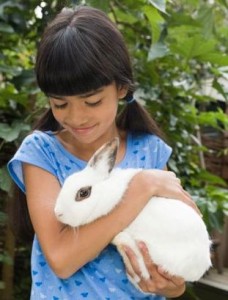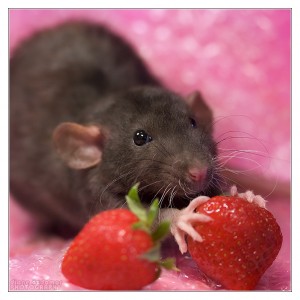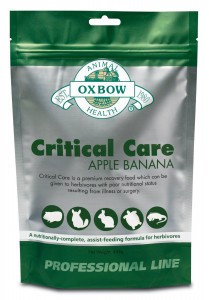Vet Questions Answered: Fit and Trim – Healthy Life for Small Animals
So, you recently picked out the sweetest, cutest, most adorable small animal to join your family. You’ve got the litter and the cage, picked out the toys to stimulate their little brains, found a water bottle and grabbed a handy bag of small animal chow… You must be all set to go home and settle in with your little one, right? Not necessarily.
It’s important to note that each small animal has their own set of dietary needs. I can’t emphasize enough that no matter what small animal you have in your home, it should have a vet, just as a dog and cat would. Your vet should see the animal at least once, for a wellness checkup. This will not only put your pet‘s information on file, but is a great time to talk diet and learn what could be ahead for the future health of your animal. If you’ve never cared for this kind of small animal before, make sure you get a list of safe and unsafe foods for your baby to enjoy and be certain that if your little one has constantly growing teeth, you have some type of food that will help wear those little choppers down.
After recently discovering a new brand of rat food in our local pet store, I sat down with our vet, Dr. Jason Smith, during a wellness exam, to talk out our options and find out what was best for the two new, growing rats we have in our home. Later on, I realized that there might be a few families out there with a first time small pet and that this conversation would be a good one to share. I asked Dr. Smith if he would be willing to answer some generic small animal questions and he agreed.
During our chat, I was not surprised to hear that there were many new small animal families in to the office this past year. Small pets are becoming very popular these days, and as a rat owner, I honestly can’t argue against their fame. Just look at their adorable faces! Who wouldn’t want these sweet little bundles of love to be a part of their home? What DID surprise me was the very beginning of our conversation…
Remember my saying earlier that you grabbed “a handy bag of small animal chow“ on your way out of the pet store? A lot of people assume that because the contents of the foods are similar, the animal on the package doesn’t matter much. You look through the clear plastic and see seeds and dried corn and some pellets that are made of some kind of Flax Seed or Oat products, plus vitamins and minerals and it looks just like the bag next to it, where the pellets are a slightly different color or size. The size difference is probably because the animal is larger and the color change simple to explain. Don’t other products remind us that color can vary with each batch? One can only assume they’re the same food, right?
Dr. Smith was very serious about this common misunderstanding, because while people are right that the CONTENTS are basically similar, it is the AMOUNT that you need to watch out for. “Many of the foods will have similar ingredients but the amount of each will be different. Small animals have different ways of breaking down food from one another and us,” he reminded me. “NEVER buy food for the wrong species!”
All right. Check that you‘ve got the right bag for the right baby. You find the right one, then read the back and it says that in addition to this food, “it is recommended to feed a limited amount of appropriate fresh fruits and vegetables.” Woah! “Appropriate?” How do you know what they mean? Again, always consult your own vet on this, because some small animals need more green leafy vegetables or vitamin C than others, but most vegetables are good for all. Most fruits are okay too, but remember to keep quantity down because, well… imagine what happens to you when you eat too much fruit.
What small animals should AVOID are things like avocados, green parts of raw potato and plants from the onion family. Dr. Smith says it is also important to avoid large quantities of grapes. And what about those bags of dried fruits and veggies at the store? They must be healthy, they’re fruits and vegetables, just dried up. Well, they might taste good, but they “won’t provide the healthy nutrition of fresh fruits and vegetables.” So fresh is the way we go at our place, especially since Dr. Smith pointed out, “Dried products are more likely to cause health problems like diarrhea and obesity.”
Giving our babies healthy fruits and vegetables must mean that if I’ve got some human food with broccoli or carrots in it, I can just let them steal a little or lick my plate when I’m done. Plenty of people do this, so we assume it must be safe. Dr. Smith reminded me that what is safest is to avoid this kind of thing completely. “The animal will consume more than you think! This often results in the pet getting toxins or large amounts of fat. Commonly, eating people food will result in a loss of appetite, lethargy, vomiting and diarrhea.” And of course avoid things with chocolate or high fat all together!
But, what if your animal is sick or needs a boost to the immune system? If they’re losing weight, can’t these foods with a little extra fat be helpful? Our vet recommends giving a product like Critical Care for these needs, which is a supplement that can be syringe fed if necessary and should be available from your own vet. Remember, elderly and sick animals that are losing weight require additional care anyway, so when you’re in for your exam, make sure to ask what they recommend to help give your baby a boost.
Of course, once you’ve read all this, you might think the issue of balanced nutrition sounds like a complicated process, but don’t let it keep you away from critters in cages. Certain small animals can be just as affectionate and loving as a dog or cat and some are even more social. If the best way to get on like peas and carrots is to share a small bite of banana, it’s well worth that extra trip to the produce department.
Dr. Jason Smith attended Rider University in New Jersey where he earned his undergraduate degree in Cellular and Molecular Biology with a minor in Chemistry. He then attended the University of Illinois College of Veterinary Medicine, where he graduated with his Doctorate in Veterinary Medicine in 2005 with honors. He enjoys all aspects of small animal medicine and surgery and has medically and surgically treated dogs, cats, rabbits, ferrets, guinea pigs, rats, prairie dogs, chinchillas, hedgehogs, hamsters, mice, gerbils and pot bellied pigs. He currently practices at both Timberlyne and Legion Road Animal Clinics in Chapel Hill, North Carolina.
Mirrani Houpe has had rats since she took home her first little boy once they both completed the second grade. Since that time she has purchased, rescued and bred many kinds of rats, from many backgrounds. She may not be a vet, psychology major, or scientist, but her babies have her very well trained when it comes to how to care for them. She is constantly working with her family’s veterinarian to come up with new and innovative ways to love and care for the most often misunderstood rodent in the pet world. You can e-mail her at mirrani@earthlink.net.
Critical Care Products At Amazon
Other Oxbow Small Animal Products Available At Pet Food Direct







